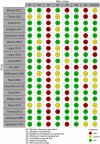Andy
Senior Member (Voting rights)
Abstract
Objective
To determine the effect of education programs on fatigue outcomes in people with neurological conditions.Data sources
MEDLINE, CINAHL, EMBASE, PEDRO until May 2025, according to PRISMA guidelines.Review methods
Systematic review with meta-analysis of randomised controlled trials comparing education versus no education/other intervention on the outcome of fatigue for people with neurological conditions. Methodological quality and risk of bias were assessed using the Cochrane Risk of Bias Tool. Pooled effects were calculated using standard mean difference (SMD).Results
We included 19 clinical trials of education for fatigue (n = 1970 participants) in five different neurological conditions. Education duration ranged from 4 to 12 weeks, 79% (n = 15) of trials included people with multiple sclerosis and 18% (n = 3) included people with stroke. Most education (11 trials, 58%) was delivered in a group setting. Education reduced fatigue compared with usual care by a SMD −0.28, 95% CI [−0.45 to −0.11]. Greater benefits for fatigue were observed when education was delivered one-to-one (SMD −0.44, 95% CI [−0.77 to −0.12]) than in group sessions (SMD −0.17, 95% CI [−0.36 to 0.01]). Mode of delivery (in-person versus telehealth) did not appear to influence the effect of education for fatigue.Conclusions
Fatigue education programs may improve fatigue for people with neurological conditions. One-to-one delivered sessions may have greater benefits than group programs and remote delivery could improve accessibility for people living in regional and rural locations.Open access

